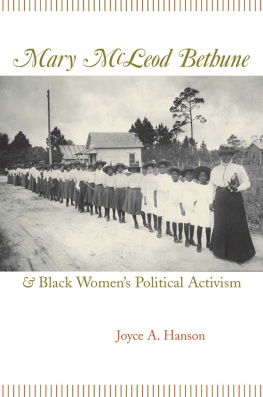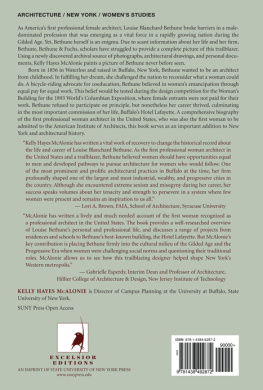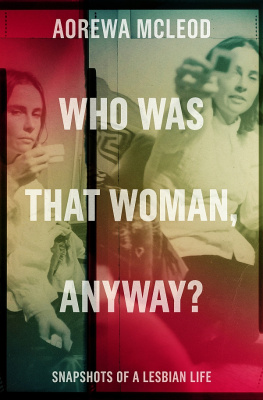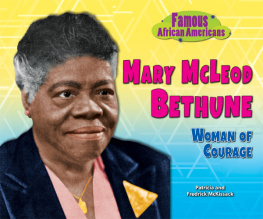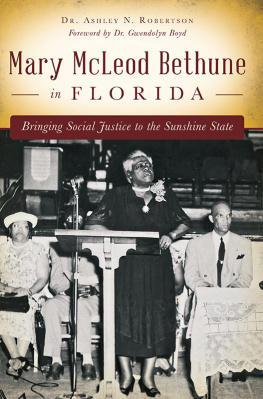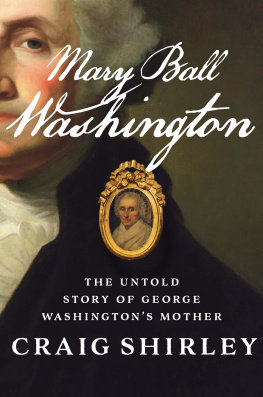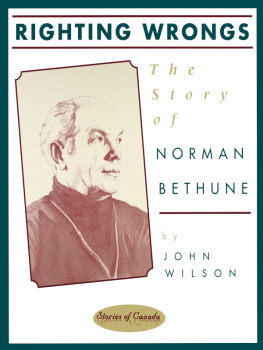Published by The History Press
Charleston, SC 29403
www.historypress.net
Copyright 2013 by Dr. Ida E. Jones
All rights reserved
Front cover: Mary McLeod Bethune, by Paul Lanquist (), 2009. Courtesy of
the National Park Service.
First published 2013
e-book edition 2013
Manufactured in the United States
ISBN 978.1.62584.084.4
Library of Congress Cataloging-in-Publication Data
Jones, Ida.
Mary McLeod Bethune in Washington, D.C. : activism and education in Logan Circle / Dr. Ida E. Jones.
pages cm
Includes bibliographical references and index.
ISBN 978-1-62619-006-1
1. Bethune, Mary McLeod, 1875-1955. 2. Bethune, Mary McLeod, 1875-1955--Homes and haunts--Washington (D.C.) 3. African American women educators--Biography. 4. African American educators--Biography. 5. African American women political activists--Biography. 6. Washington (D.C.)--Biography. 7. African American women--Washington (D.C.)--Social conditions--20th century. 8. African Americans--Education--Washington (D.C.)--History--20th century. 9. African Americans--Civil rights--Washington (D.C.)--History--20th century. 10. Washington (D.C.)--Race relations--History--20th century. I. Title. E185.97.B34J67 2013 370.92--dc23 [B] 2013019202
Notice: The information in this book is true and complete to the best of our knowledge. It is offered without guarantee on the part of the author or The History Press. The author and The History Press disclaim all liability in connection with the use of this book.
All rights reserved. No part of this book may be reproduced or transmitted in any form whatsoever without prior written permission from the publisher except in the case of brief quotations embodied in critical articles and reviews.
Foreword
Once in a century, a person comes along who will change the way everyone views the world while simultaneously fueling worldwide social movements. Passionately committed to all methods of social reform, Mary McLeod Bethune created institutions that improved the daily lives of people on the local, regional, national and international levels. This study seamless fuses together the life of Mary McLeod Bethune while creating a new base for appreciating the life of a remarkable activist and agent of change.
My interest in the National Council of Negro Womens (NCNW) and Mrs. Bethunes role in community-based activities was tremendously stimulated when I spoke to longtime residents of the community where she lived in the nations capital. As I listened to the words of people like Mrs. Amy Bundy, Mrs. Mary Sprow and Mrs. Jessie Carter, I learned of her support for the block clubs. The written and photographic materials accumulated from the early 1920s by Mrs. Eliza Johnson provide clear evidence of the many ways this national figure encouraged local womens garden clubs. I read through documents from activities at local churches and the community YWCA to learn the myriad ways this major figure in history created a remarkable legacy in her District of Columbia community. Dr. Joness research illuminates my research on numerous levels.
In this book, Dr. Ida E. Jones uses multiple approaches for inquiry by focusing on Dr. Bethunes organizational advancement, government program development and political activities to address the negative race and gender images pervasive during her lifetime. The NCNW was chartered in the District of Columbia as a national womens organization specifically to lobby for the rights of African American women and children. In addition, her personal goals were to highlight the historical contributions, current capacity and future potential of African American women. She dedicated her life to addressing the neglected areas of accomplishment for her race all over the United States.
Although she was one of the most influential women of the twentieth century, Mary McLeod Bethunes contributions as an activist outside the United States are central to this book, which expands the diaspora themes and international policy actions impressively explored by many scholars today. As a co-founder of the International Council of Women of the Darker Races of the World, her leadership and policy development strategies affirm her focus on enhancing the condition of women and children of color in countries as diverse as Nigeria, Brazil, Puerto Rico, Haiti and the Philippines. Famed as an African American educator, the leader most well known for the creation of the National Council of Negro Women led reform efforts in Cuba and Liberia. As examples of her unparalleled respect in areas outside of the United States, Dr. Bethune was awarded the Haitian Medal of Honor
in 1949 and the Medal of Africa in 1952.
Mary McLeod Bethunes spirit of literary inquiry is embedded in her writings. In her educational leadership texts, she encouraged all students to strive for good manners, a robust work ethic and a deep-seated respect for heritage. Her newspaper writings always called on readers to use positive actions to contend with obstacles. This leader invited readers to create appropriate responses to unjust actions grown out of ignorance.
As a person respected all over the world, her home was a place of refuge for international visitors, leaders from all over the United States and women from her surrounding communities. Mrs. Bethune adeptly advised leaders from all over the world on gender equality, counseled the president of the United States on equal employment opportunity and guided neighbors on characteristics of seed-bearing plants.
To quote Dr. Bethune, this work establishes her matchless determination to invest in the human soul; her courage to change old ideas and practices so that we may direct their power toward good ends; and a persistent belief that knowledge is the prime need of the hour.
DR. ELIZABETH CLARK-LEWIS
Professor of History
Howard University
Preface
The condition of the African American woman presents a peculiar position. At the nexus of two marginalized groupsAfrican Americans and womenher worldview provides her with a unique vision where humanity is able to breathe freely, harness their strengths and live full lives. Through collective action in the form of the club movements as well as via individual endeavors, these women made their voices heard. Thus, the extraordinary life of Mary McLeod Bethunewhich spanned two centuries, two world wars and the Great Depressioncontributed significantly to this tradition. She was an educator, race leader and humanitarian. This work examines the life of Bethune when she resided in Washington, D.C., from 1943 to 1949. During this brief window of time, she grew the National Council of Negro Women (NCNW) from a small organization intended for greatness into a national organization that became the leading voice of Negro womens activism/agency.
Bethunes life in Washington fulfilled a longstanding dream to house a national Negro womens organization in the nations capital to lobby for the rights of Negro women and children. Moreover, the national headquarters served as the community space where the world could meet and engage Negro women as citizens. NCNWs house provided literal and figurative sanctuary for Negro women. The business affairs of the NCNW, such as publishing and mailing the Telefact




